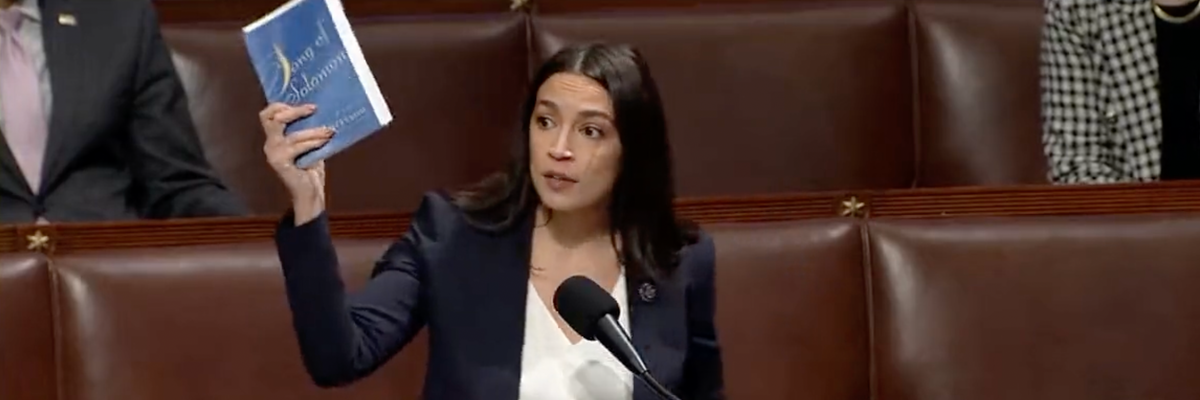Progressive lawmakers and education advocates on Friday condemned federal Republican lawmakers' foray into the nationwide attack on people of color and the LGBTQ+ community as the GOP-led U.S. House passed the so-called Parents Bill of Rights Act—legislation that critics said is aimed at banning books and further ostracizing marginalized communities, while providing no improvements to children's safety at school.
Like legislation passed in at least six states and introduced in at least 26, the Parents Bill of Rights Act (H.R. 5) claims it will protect public school students by requiring schools to make classroom curricula publicly available and provide parents with a list of reading materials in school libraries.
School districts would also be required to inform parents about violent activity that takes place at schools, hold at least two parent-teacher conferences per student per year, and make budget information public.
The legislation was passed a day after the American Library Association (ALA) released a report showing that a record-breaking 2,571 book titles were the subject of "challenges," or demands that they be removed from schools or public libraries, in 2022—a 38% increase from the previous year.
"Conservatives have weaponized hate and fear to try to tear our schools apart, with students who just want to learn and thrive turned into pawns in their political games."
Ninety percent of the attempted book bans were part of challenges to multiple books, suggesting they are increasingly being driven by right-wing groups such as Moms for Liberty instead of individual parents who have concerns. The ALA said this trend began in 2021, as Florida Gov. Ron DeSantis was pushing legislation to ban accurate classroom discussions about the history of racial injustice in the United States.
Schools in Florida have now removed dozens of book titles from shelves, including The Life of Rosa Parks and Who Is the Dalai Lama? as officials assess whether the material is appropriate for children.
"Forty percent of banned books are reported as significantly addressing LGBT issues," said Rep. Alexandria Ocasio-Cortez (D-N.Y.) on Thursday as the House debated the bill. "When we talk about progressive values, I can say what my progressive value is and that is freedom over fascism."
Speaking about marginalized people and children, Rep. Cori Bush (D-Mo.) said the legislation is the work of a political party that is "trying to 'write us out' of the curriculum."
Rep. Rashida Tlaib (D-Mich.) expressed outrage at the notion that Republicans are seeking to protect children by limiting their access to material dealing with LGBTQ+ issues and American history, considering that have blocked numerous pieces of gun control legislation even as gun violence has overtaken car accidents as the leading cause of death of children in the United States.
"Since Columbine over 20 years ago, more than 344,000 students in our country have experienced gun violence at school," said Tlaib. "Some of our children attend schools with unsafe drinking water. Others go to school in districts attempting to erase Black history from our classrooms by banning books like The Life of Rosa Parks. These are some of the real obstacles to our children thriving."
"When this bill was considered in committee, Democrats offered amendments that would keep firearms out of classrooms, remove lead pipes from our schools, and prevent censorship of Black history. But every single amendment aimed at the real threats to our children was voted down by these MAGA Republicans," she added. "It makes me angry to see how conservatives have weaponized hate and fear to try to tear our schools apart, with students who just want to learn and thrive turned into pawns in their political games."
The National Education Association noted that the legislation, which the Democratic-led Senate is not expected to take up, offers solutions to a number of problems that don't widely exist and promotes a "toxic vision of parental engagement" in schools.
The bill "contains a list of provisions already ensured by local and state law, including, but not limited to, a parent's right to view a school's budget or speak at a public school board meeting," wrote Tim Walker, a senior writer for the organization.
A survey released by Navigator this month showed that parents' top concerns about education are "making sure their children learn what they need to be successful, keeping them safe from gun violence, and protecting their mental health" and that having a "say in what their kids are learning" is not a high priority for a majority of parents.
A poll by National Public Radio last year also found that 76% of parents believe their children's schools keep them well-informed about the curriculum and classroom activities.
"At least in my experience, teachers have always been able to be accessible to parents, and I don't know what these parents' rights bills will do other than give more power and pathways to things like book banning and elimination of resources," York, Pennsylvania teacher Ben Hodge told Education Week recently.
American Federation of Teachers President Randi Weingarten said the bill is an example of "divisive performance politics" by the GOP.
"Every day in classrooms and communities around the country, parents and educators work tirelessly together to make the lives of our kids better and provide them with the knowledge they need to excel—with books, art, and music; tutoring programs and capstone projects; and counseling to help them navigate life, tackle challenges, and deal with trauma," said Weingarten. "The true work of partnering to support families and help our kids do well involves having meaningful discussions about the real things affecting our students and what we, as a country, must do to help."
